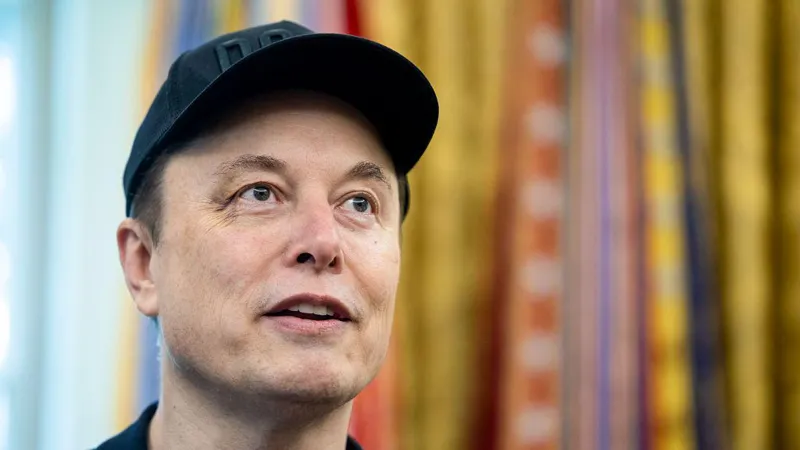Elon Musk Urges Public to Oppose Republican Bill, Sparking Political Debate

Elon Musk, the tech billionaire and former special government employee in the Trump administration, has launched a vehement public campaign against President Donald Trump's signature tax and spending legislation, a bill Trump champions as his "big, beautiful bill." Musk's outspoken criticisms, which emerged shortly after his departure from a cost-cutting role within the administration, are not only a direct challenge to the President but also reflective of wider, pre-existing tensions within the Republican Party regarding the bill's fiscal implications.
Using his platform on X (formerly Twitter), Musk has urged Americans to contact their representatives to "kill the bill," labeling it a "disgusting abomination" and an "outrageous, pork-filled" piece of legislation. He warned that the bill would massively increase the already substantial U.S. budget deficit, potentially to $2.5 trillion, and saddle American citizens with "crushingly unsustainable debt." His condemnation included a stark message: "Shame on those who voted for it. You know you did wrong."
Further escalating his opposition, Musk threatened to actively support primary challenges against Republican politicians who back the bill in the upcoming midterm elections. This represents a significant turn, as Musk had previously been a major financial donor to Republican campaigns, including over $250 million to support Trump in the last election. His stance follows a 129-day (or 130-day, according to one report) tenure where he led a team known as "Doge," tasked with identifying wasteful government programs and bloated departments to slash costs.
The contentious bill, a legislative linchpin of Trump's potential second-term agenda, proposes substantial changes. It includes extending the tax cuts passed during Trump's first administration in 2017, a significant influx of funds for defense spending, and resources for the administration's proposed mass deportations of undocumented immigrants. Critically, it also aims to lift the debt ceiling—the limit on government borrowing—to $4 trillion. Having narrowly passed the House of Representatives, the bill is now being considered by the Senate, with Republicans aiming for a July 4th passage deadline. The bill is estimated by some to increase the budget deficit by approximately $600 billion in the next fiscal year.
The Trump administration has pushed back against Musk's financial warnings. The White House issued a "myth buster" statement, asserting that any claim the bill would lead to higher deficits is a "hoax" and that "by every honest metric," the bill "dramatically improves the fiscal trajectory of the United States." White House Press Secretary Karoline Leavitt stated that President Trump "already knows where Elon Musk stood on this bill" and that "he's sticking to it." Interestingly, to appease fiscal conservatives, Trump is also asking Congress to pass a separate plan for $9.4 billion in spending reductions, derived from the work of Musk's "Doge" team, primarily targeting foreign aid, USAID, and public broadcasters NPR and PBS.
Speculation abounds regarding the motivations behind Musk's sudden and fierce opposition. According to U.S. media reports, the White House is attempting to frame Musk's stance as a reaction to the bill's proposed cuts to green energy subsidies, including tax credits for electric vehicles like those produced by Musk's company, Tesla. Speaker Mike Johnson also alluded to this, mentioning after a phone call with Musk that the phasing out of EV tax credits could "have an effect" on Tesla. Axios reported additional potential sources of tension, including Musk's displeasure that his Starlink satellite system was not chosen to run air traffic control for the Federal Aviation Administration (FAA) due to technology and conflict of interest concerns, and Trump's decision to withdraw the nomination of Jared Isaacman, a Musk ally, to head NASA.
Republican leadership in Congress, while acknowledging the controversy, has signaled determination to pass the bill. Senate Majority Leader John Thune stated unequivocally, "Failure is not an option." He downplayed Musk's influence, asserting the party plans to "proceed full speed ahead." Thune mentioned that after approximately 18 meetings, the Senate Finance Committee is dedicated to crafting beneficial legislation and that "the wheels are in motion," expressing hope for 51 Senate votes and eventual passage back through the House for Trump's signature. He admitted, "it’s not going to be easy," but affirmed, "we will get this done one way or the other."
Speaker of the House Mike Johnson, who ushered the bill through the lower chamber, described Musk as "terribly wrong" and expressed regret over Musk's "mistake" after a 20-minute phone call discussing the legislation. Johnson reportedly also worked to reassure Republican members concerned about Musk's threats to support primary challengers. Other Republican voices have offered varied perspectives. Senator Lindsey Graham, a staunch Trump ally, conceded the bill "can be made better" but urged its passage, suggesting further spending cuts could follow. Meanwhile, existing party divisions are evident, with Senator Rand Paul having voiced opposition to the bill if it raises the debt ceiling, drawing Trump's ire. In contrast, Senator Mike Crapo (R-ID) asserted "very strong support" and "very strong unity" within the Republican conference for the President's top agenda item.
Democrats, historically critical of both Musk and Trump, have seized upon the billionaire's comments. Senate Minority Leader Chuck Schumer remarked, "Even Elon Musk, who's been part of the whole process, and is one of Trump's buddies, said the bill is bad. We can imagine how bad this bill is." This sentiment suggests Democrats will likely remain unified in their opposition to the legislation.
The escalating feud between the influential tech magnate and prominent figures within the Republican party, including President Donald Trump himself, adds a new layer of complexity and public scrutiny to the "big, beautiful bill." As Republicans navigate internal disagreements and race against a pressing deadline, Musk's high-profile opposition and threats of political retribution could significantly impact the legislative battle and the broader political landscape heading into the midterm elections.










